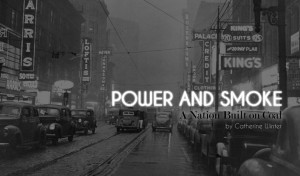At the time the settlers arrived at Plymouth Rock, people back in England had already been burning coal for generations. Londoners complained about coal smoke during Queen Elizabeth I’s era. A century before the American Revolution, in 1660, an Englishman named John Evelyn published one of the world’s first treatises on air pollution. He complained for pages about coal in London.
People would have preferred to burn wood to keep warm and cook food. Wood smoke smelled sweeter. But they had cut down the forests of England. Only rich people could have roaring wood fires.
So it’s no surprise that when Europeans arrived in America, the natural resource they were excited about wasn’t coal; it was wood. America had vast expanses of forest.
Settlers in America cleared land for farms, and burned the wood. Wood was easy, and America’s coal was hard to get at. It was on the other side of mountains, and there weren’t railroads or canals yet.
By the time of the American Revolution, there were still no factories in North America. And once Americans finally began to develop factories in the 19th century, they powered them with falling water. And built them where there were rivers with enough force.
Listen to the entire documentary or read the transcript at American RadioWorks: Power and Smoke: A Nation Built on Coal.



